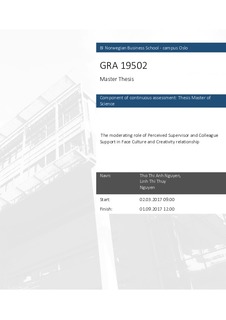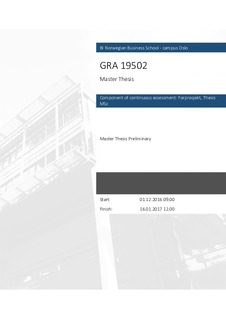| dc.contributor.author | Nguyen, Tho Thi Anh | |
| dc.contributor.author | Nguyen, Linh Thi Thuy | |
| dc.date.accessioned | 2018-02-08T11:56:59Z | |
| dc.date.available | 2018-02-08T11:56:59Z | |
| dc.date.issued | 2017 | |
| dc.identifier.uri | http://hdl.handle.net/11250/2483500 | |
| dc.description | Masteroppgave(MSc) in Master of Science in Leadership and Organizational Psychology - Handelshøyskolen BI, 2017 Masteroppgave(MSc) in Master of Science in Business, Leadership and Change - Handelshøyskolen BI, 2017 | nb_NO |
| dc.description.abstract | Creativity is admitted being the lifeblood of the majority of the most
successful organizations, and highlighted as the key ingredient for long-term
organizational sustainable development. The latest research in the field reveals
that creativity includes two stages: idea generation and idea implementation. On
the other hand, the applicability of the creative ideas could be significantly
limited because of the effect of face culture. This is because members in face
culture avoid creativity-related activities, such as "rocking the boat" and risking
failure in the public.
This paper focuses on a new perspective regarding the moderator role of
perceived supervisor support (PSS) and perceived colleague support (PCS) in
mitigating and facilitating the effect of face on creativity through two studies
applying both quantitative and qualitative methods.
Through the quantitative Study 1, the authors find out that while PSS
mitigates the effect of face culture on creativity, PCS facilitates the influence.
While the former is consistent with predicted hypothesis, the latter is against the
forecast. The causes are explained in Study 2 and can be summed up into two
main categories: Supervisors are less affected by face culture, thus, give honest
and constructive feedback for idea implementation. Meanwhile, colleagues obtain
higher levels of face and tend to save other’s social image by harmonious
comments.
In addition to the theoretical contribution, the paper also suggests
implications to create an environment for creativity by emphasizing the
perception of supervisor’s support on both task and relationship-oriented aspects,
creating a cooperative atmosphere among coworkers, and considering workers’
positions while promoting creativity. | nb_NO |
| dc.language.iso | eng | nb_NO |
| dc.publisher | BI Norwegian Business School | nb_NO |
| dc.subject | ledelse | nb_NO |
| dc.subject | organisasjonspsykologi | nb_NO |
| dc.subject | leadership | nb_NO |
| dc.subject | organizational psychology | nb_NO |
| dc.subject | change | nb_NO |
| dc.title | The moderating role of perceived supervisor and colleague support in face culture and creativity relationship | nb_NO |
| dc.type | Master thesis | nb_NO |

